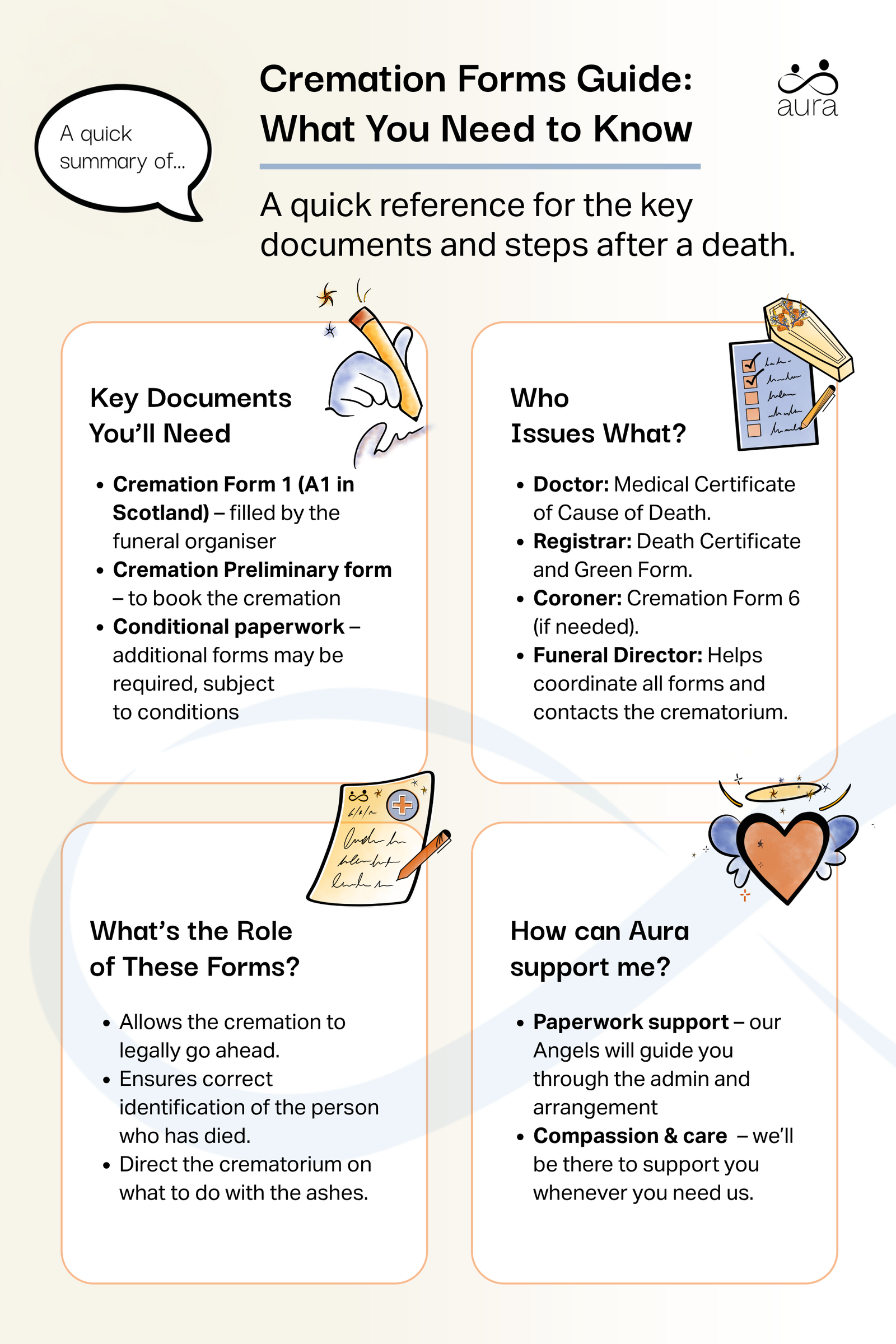





Written by Adam McIlroy.
16 minute read

One of the first things people tend to notice when they are planning a funeral is how much admin is involved, and perhaps they find themselves wishing they had a cremation forms guide. Any death can lead to a lot of paperwork, but if we are dealing with our grief, it can be especially difficult to keep these administrative matters in mind – and there is a lot to keep in mind. We may need to go through probate in order to oversee their estate; we may need to access or close their financial accounts; and, of course, we’ll need to register the death.
We have written this article to provide you with a cremation forms guide, helping you to understand the importance of cremation forms, how they fit in with the other paperwork that needs to be done, and how they support the wider cremation process from a legal and administrative point of view.
We also just wanted to say that, if you’ve been led to this article by a recent bereavement in your life, we recognise the possible difficulty and emotional complexity of your situation. Aura is the UK’s top-rated provider of ‘Cremation Services’ on Trustpilot, and if you require our support, we are here to help you. Our Aura Angel team is ready to lead you by the hand through all of the difficulty of funeral arranging, bringing their expertise to bear on cremation-related legal requirements and administrative matters, as well as lending you a caring ear should you wish to talk about what you might be feeling.
Key takeaways:

Cremation forms are an important part of the paperwork that follows on from registering someone’s death, alongside the death certificate.
Cremation Form 1 (or the Application to Cremate) is a legally required form in England and Wales that will need to be completed by the person arranging the funeral. This is usually the next of kin, or executor of the will. Cremation Form 1 is essentially an application form required by the crematorium in order to authorise a cremation. In Scotland, Form A1 replaces Cremation Form 1.
The “Green Form” – officially known as the Certificate for Burial or Cremation, is the document that lets the funeral service provider, crematorium, or burial facility know that the death has successfully been registered, and that the local authority has given their permission for the funeral to go ahead. In Scotland, a Green Form is not required, but Form 14 will be issued.
These documents not only allow the funeral to proceed legally, but they contribute to confirming the funeral wishes for the person who has died. They also help the party carrying out the funeral to correctly identify the individuals they have in their care, as they can use them to cross-check against their own records. It can also help them to keep track of the remains after a cremation, for instance, before returning the ashes to the next of kin.
If you are arranging a direct cremation with Aura, most of the time the Registrar’s office (the institution where a death needs to be registered) will send the Green Form to us, and we will pass it along to the crematorium; sometimes, though, the Registrar will simply send it directly to the crematorium – it depends on the locality.

Whether someone dies in a hospital, or if someone dies in a care home, or anywhere else, the process of registering the death is largely the same, and will require largely the same set of paperwork: the Cremation Form 1 (or a Form A1 in Scotland), a Medical Certificate of Death (MCCD), a Death Certificate, and the Green Form. Each one has a slightly different purpose, and each one is very important.
In England and Wales, ‘Cremation Form 1’ is officially titled the ‘Application for Cremation of the Body of a Person Who Has Died’. This form is a legal requirement under the Cremation (England and Wales) Regulations 2008 and the applicant must be someone aged 16 or over. 
The form collects essential information, including:
The applicant must also declare that all provided information is accurate and acknowledge the legal implications of making false statements. This form ensures that the cremation process complies with legal standards and respects the wishes of both the person who has died and their family.
In Scotland, the Cremation Form 1 is replaced with the Form A1.
The Green Form gives the crematorium or burial facility the confidence to know that the funeral has been officially approved, and that it can occur. This procedure normally entails that the cause of death supplied by the medical professionals attending the person who has died has been accepted; the death can’t be registered without that, and the Green Form can’t be issued without the registration of the death. You might want to consider starting a funeral checklist in order to keep all of the administrative matters organised. This can make things easier when we are dealing with the unexpected death of a loved one, or trying to cope with the death of a parent.
Many people wonder whether you need a Death Certificate for a funeral. Whilst the Death Certificate is issued when you register the death, and you can’t have a funeral without doing so, it is the Green Form that gives explicit authorisation for a funeral to go ahead. The Death Certificate shows that you have officially registered the death of the person for whom you are arranging a funeral; the Green Form is all the crematorium or funeral service provider will need to see, though, and it is issued along with the Death Certificate.
Getting the Death Certificate is one of the main things you’ll need to do when someone dies. It’s very important for legal requirements, such as allowing you to apply for probate in order to execute their will (or a Grant of Letters of Administration when someone dies without a will). You will also need it if you require access to the bank accounts of the person who has died in order to pay for their funeral, or in order to secure a payout on their over 5os life insurance policy, as you will need to prove to these institutions that they have died before this is possible.
Before either the Certificate for Burial or Cremation, or the Death Certificate can be issued, the Medical Certificate of Cause of Death first needs to be issued by the doctor attending the person who has died. The MCCD is a medical certificate whose purpose is to specify how the death occurred, by listing an immediate cause of death, as well as any underlying causes which may have contributed to it.
Following changes to the death-registration process in September 2024, the immediate and underlying causes of death proposed by the attending physician need to be certified by the ‘Medical Examiner’; this change in procedure makes it far less likely that things would need to be referred to the Coroner, which helps to avoid needless delays. The cause of death which they settle on is what is carried over onto the Death Certificate.
In cases where the death was sudden, unexplained, or where the Medical Examiner fails to discover the cause of death, the matter can be referred to the Coroner (or Procurator Fiscal in Scotland), who will take over. The Coroner could then launch an investigation, or even an inquest in order to discover the cause of death, which may include a post-mortem examination. In order to prevent any Coroner-related delays impacting the death registration process, they can issue a document called an ‘Interim Death Certificate’. It allows the death to be registered just as in the normal way, and for the funeral to proceed.
Please note that, in situations where a death has been referred to the Coroner in order for the cause of death to be determined, then a Green Form is not required; instead, the Coroner will issue ‘Cremation Form 6’. In Scotland, deaths are not referred to the Coroner, but the Procurator Fiscal; they will supply an E1 Form, but Form 14 will still be produced as normal.
Cremation forms, such as the Green Form, are important as they help the different moving parts involved with coordinating a funeral to stay on track. They provide a record of legal authorisation to move ahead with a funeral, as well as reassurance to the medical referee at the crematorium or burial site as to the identity of the person they have with them. This is obviously important before any funeral goes ahead, but also for correctly distributing the remains to the next of kin, as after a cremation, for instance.
The role of a funeral director like Aura is, among other things, to provide administrative support to the families who need to organise a funeral. In this capacity we will check to make sure that the paperwork is correct, and not leave it all to you, if that’s not what you want.
We hope that this cremation forms guide has been helpful for you. If any questions have arisen, whether about registering a death, getting a Death Certificate, or the purpose of the Green Form, we are here to help you and to signpost you to useful resources.
At Aura, we pride ourselves on the compassion, patience and kindness of the service we offer those in need of our funeral services. They are available to both those who need to arrange a direct cremation at short notice, as well as those looking to the future with a prepaid funeral plan. In both cases, it’s our wonderful, compassionate Aura Angel team who’ll be there to guide you or your family through the difficult experience of funeral arranging for a loved one. They’re not only experts in funeral coordination, but they are kind and compassionate people who will support you through the process. We’re there for you on the phone, whenever you’re ready.
We’re a family-run company, founded by Paul Jameson in 2019 after he learned that he has motor neurone disease. He established Aura in order to help families in the UK to benefit from his confrontation with death, and his experience with end-of-life planning. He runs the company today alongside his son, David (our CEO), and a family friend called Ben (our COO). Aura’s mission is to provide a service that never compromises on quality, and never drops below what Paul wants for his own family. We’re sure that we have an option that would suit you, whatever your needs.
There are a number of ways you can obtain and complete cremation forms. Many find working with a funeral home or crematorium to be helpful, where others prefer to consult the local authority. Preplanning services can also streamline the process by preparing documents in advance.
If you were to choose Aura to help you with arranging a simple cremation, our Aura Angels will be there to guide you through the paperwork. You will need to complete Cremation Form 1 (Form A1 in Scotland), as well as any preliminary forms which can vary by locale. The Angels can provide all the help and guidance that you will need in order to locate and complete the relevant forms. They will also make sure that they are completed and signed correctly, and in a legally compliant way. Once completed, they will send all relevant documentation to the crematorium so that they will know exactly what needs to happen next.
You will need to register the death of the person who has died at the Registrar’s office local to the area where they died. After this meeting, you will be given their Death Certificate – a very important document for legal purposes. At this meeting, you can also notify the Registrar that you have chosen to appoint Aura as the funeral director, at which point, they can liaise with us, and send us the Green Form directly. In some cases, they will send it straight to the crematorium or funeral home.
Naturally, if you want to handle the Cremation Form 1 and possible preliminaries yourself, without the input of a funeral director, then the Registrar should be able to provide further information on where to obtain the correct forms.
Another way that you can clarify the cremation forms and other admin that needs to be done for a funeral, is to consider arranging your funeral in advance. Aura offers prepaid funeral plans for those looking to the future; as part of this process, we can make you and your family aware of the necessary paperwork in advance. This has the benefit of sparing your family from administrative pressures when the time comes, when they may be going through a difficult time.
We hope that you have found this cremation forms guide helpful. If you’re currently organising a funeral for a loved one, we want you to feel as confident and well informed as can be. Our Angel team is always ready to take your call if you have any questions with the required admin; they’re here to support as much as is needed.


Yes. You must register the death before a cremation can take place, and registering the death will result in a death certificate being issued. However, it’s the Certificate for Burial or Cremation (the Green Form) that authorises the funeral itself—not the death certificate. You’ll likely need the death certificate later to handle legal and financial matters such as probate or insurance claims.
The Green Form is the Certificate for Burial or Cremation, and it’s issued by the Registrar when a death has been successfully registered. It confirms that the local authority has authorised the funeral. The Registrar may send this form directly to the crematorium or funeral provider, like Aura, depending on your local authority.
Cremation Form 1 must be completed by the person arranging the funeral, usually a next of kin, family member, or executor. It contains details about the person who has died, any medical implants they may have had, and what should happen with their ashes after the cremation.
If a Coroner investigates the death, they may issue Cremation Form 6, which replaces the need for a Green Form. This often happens if the cause of death is unclear, sudden, or accidental. In Scotland, the Procurator Fiscal is responsible for this, and the process is slightly different.
There are some differences. In Scotland:
Form A1 replaces Cremation Form 1.
There is no Green Form; instead, Form 14 is used to authorise burial or cremation.
The Procurator Fiscal handles cases similar to a Coroner’s in England and Wales.
Absolutely. Aura’s team—known as our Aura Angels—are experts at guiding people through funeral paperwork. Whether you’re arranging a cremation now or preplanning for the future, we’ll help make sure every form is completed correctly and submitted on time.
Planning ahead can ease the administrative burden. Aura offers prepaid funeral plans, allowing you to sort all necessary paperwork in advance. This means your loved ones won’t be left dealing with forms during an already difficult time.
Call Aura. If someone has died and you need to act quickly, our Angels can begin arrangements right away, guide you through the forms, and make the process as smooth as possible. We’ll even liaise with registrars and crematoria on your behalf so you’re not left to chase documents yourself.
Yes. Aura specialises in direct cremation, which doesn’t require an in-person visit. Everything can be arranged by phone, including completing cremation forms. We’re set up for families who need simplicity, fast action, and compassionate guidance.